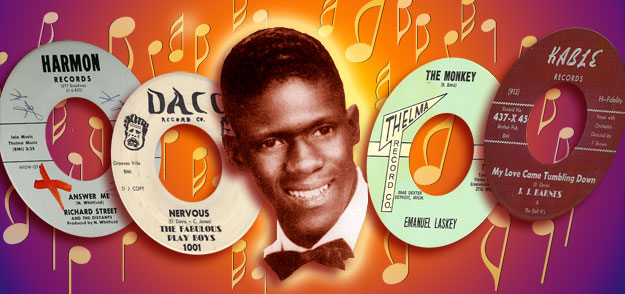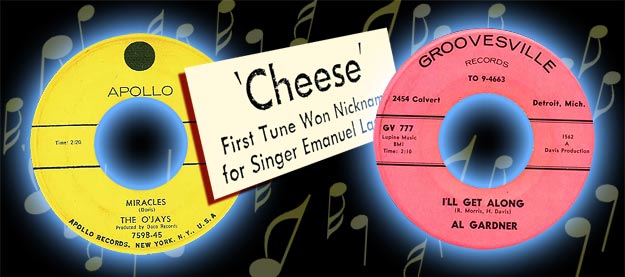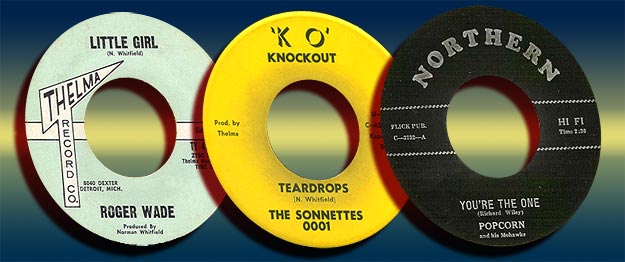
Robert
and Hazel Coleman helped to fund these Daco and Kable 45s
before starting their own label, Thelma, which they named
after their daughter.
|
“Calling Mister Kennedy
it’s an emergency
Hand me some of that welfare cheese”
Welfare Cheese
 |
A Northern Soul legend and star of 60’s
Detroit - Emanuel Laskey might not have set Billboard’s charts
on fire, but who cares. As Clay McMurray stated in his own
introduction to this
webisode, Emanuel possessed a special, distinct voice that music
lovers in the Motor City adored. Backed by the “finest musicians
in the whole wide world” his great recordings resonate four
decades later.
|
RIP Emanuel Lasky... June 23, 2006
We are saddened to report
the passing of Emanuel Lasky who passed away
in his apartment on June 23, 2006. Mr.
Lasky had been suffering from cancer. |
|
Click Here to
Read SoulfulDetroit Forum Discussion of
Emanuel Lasky. |
|
Like piecing together a jigsaw, documenting
Emanuel Laskey’s career involves putting various parts of
Detroit’s musical history into place. And although Emanuel never
recorded for Johnnie Mae Mathews, that’s where this webisode
begins.
By the end of 1960, Johnnie Mae had cut seminal Soul recordings
on various artists like The Distants and a talent-laden group
that included a young guitarist, Don Davis, “When I got out of
high school, in ’58, I was playing with Joe Weaver. Jamerson put
the upright bass down and started playing Fender bass - at that
particular point, Johnnie Mae Matthews was the gravity point for
people like Popcorn, The Temptations, myself, Jamerson and Eli
Fontaine.”
Johnnie Mae decided to record Don jamming The Groove with Eli Fontaine
(sax), Joe Hunter (piano), James Jamerson (bass), Uriel Jones
(drums) and Eddie Willis (guitar), who are appropriately
credited as The Groovers. Most of these maestros are now know as
principal members of Motown’s famed Funk Brothers.
With that Northern label 45 under his belt, Don reassembled this
super rhythm section at the United Sound studio later
in 1960 to play on a ballad he’d written - My Love Came
Tumbling Down - that marked J. J. Barnes’ debut in the music
biz. Young J J was backed by the Del-Fi’s - later to develop
into The Vandellas – with financial backing coming from Don’s
brother, Will, plus $1,500 from Robert and Hazel Coleman, who
were business partners of label-owner-cum-postman, Fred Brown.
The record’s up-tempo flip got all the airplay; it was a catchy and
raucous song titled Won’t You Let Me Know that Nashville’s
influential DJ “John R” Richbourg re-released it on his own Rich
label. But it seems that this early Soul gem was before its time
and the 45 failed to dent the national charts. Nevertheless, Don
had garnered street-cred and established a good relationship
with the Coleman’s. Thelma Records had effectively been
conceived.
Soon after they started Daco - an amalgam of Davis and Coleman -
and began working from a first-floor office at 3942 John R, on
the corner of Alexandrine in Detroit’s Black Bottom. The company
soon attracted local talent and The Fabulous Playboys, led by
Sonny Monroe, signed and cut their riotous Nervous at the start of
'61.
Another great Daco recording of theirs, Honky Tonk Woman, was
leased to the New York-based Apollo label and its bluesy flip
-Tears, Tears, Tears – marked a stepping stone in James Jamerson’s inimitable style.
As Don Davis explained:
“That’s where he came up with that first – da-ga-doon,
da-ga-doon. I remember I said to him, lets do, ‘Fool –
da-ga-doon, Fool da-ga-doon, Fool da-ga-doon’ and he learned
that lick - and it was a so hard for him to learn. But it was
his trademark; every record he made after that, the da-ga-doon
was in there.”
Apollo also released a Daco recording by The O’Jays, a group
from Ohio that Don recalled meeting while gigging in Cleveland:
“There was a disc jockey, Eddie O’Jay, he brought the group to me
in Cleveland. He brought them over to the hotel and said ‘Don I
want you to hear this group, etcetera, etcetera’. I said, well
let's bring them down to Detroit – I like ‘em. We recorded this
record – Miracles – and we sit there and ponder about what the
name of the group was gonna be. I said why don't we just call them The O’Jays, right after you? And that’s how they got their name.
"

Don Davis decided to give the
O’Jays their name after meeting them through a Cleveland DJ
named Eddie O’Jay.
Between 1961 and 62, Don spent most of his
time living and studying in Indianapolis, coming back to Detroit
for flying visits during the week. He had already registered his
Groovesville publishing company with BMI – you can just see it
on the Daco 45 at the top of this page – and in February ’62 he
launched his own label – shown above. This was a re-recording
of a
song Al Gardner had previously done for Robert West’s Lupine
label titled I’ll Get Along, which Don had played guitar on.
The address on the disc was Don’s home – 2454 Calvert.
In August 1962, the Colemans launched a new label called Thelma, named after their daughter, and that year’s Yellow Pages carried
an advert, giving their address as 8040 Dexter Boulevard and
stating “Talent Exposed To The Music World”. The label’s first
45 was penned and produced by Norman Whitfield, a song called
Answer Me that was sung by Richard Street and The Distants. By
this time the group included Alphonso Galloway, Richard Street
and James Weaver, plus a singer simply remembered as Johnny.
Their record got picked up by Harmon Records, but failed to
sell. And neither did 45s by Alberta Adams, Roger Wade, Will
Hatcher or Don’s re-release of his Northern label disc
The Groove, this time credited to The Magnificent Seven.
But this string of flops didn’t seem to deter Emanuel Laskey,
who had signed with the company in ’62. Born on June 20th, 1945
and brought up on the city’s east side, Emanuel and his family
moved from Black Bottom across to the west side of Detroit when
he was a teenager - to 11711 Dexter Avenue. Consequently he and
his brother Charles left Eastern High to attend North Western
High.
During that time, Thelma Records had moved their office from
Dexter to Grand River, just across the street from Emanuel’s new
high school. Emanuel told me how he got to record his first 45.
“I had a song, Welfare Cheese, that Don Davis heard. He said
it was catchy and we went to United Sound after everything had
been rehearsed -- we recorded Welfare Cheese and a song called
The Monkey - played by a group called The Ohio Untouchables,
which later became The Ohio Players.”
Released in September ‘63, Welfare Cheese was the first smell
of success for Thelma Records and Emanuel was nicknamed Cheese,
a name that stuck for years. The song’s lyrics include a
reference to President John F. Kennedy, which rendered the 45 a
dead duck after JKF was assassinated in November.

Johnnie Mae Mathews owned
the Northern label. Norman Whitfield was a tambourine player in
Popcorn Wylie’s Mohawks before writing & producing at Thelma.
Norman Whitfield started his prolific songwriting career with
Thelma and produced The Sonnettes, a group that had the only two
records on a label called KO. This was funded by record
distributor Armen Boladian, who was involved with Thelma’s
operations; his Bridgeport publishing company can be seen on
some of the early releases, such as Crazy.
|